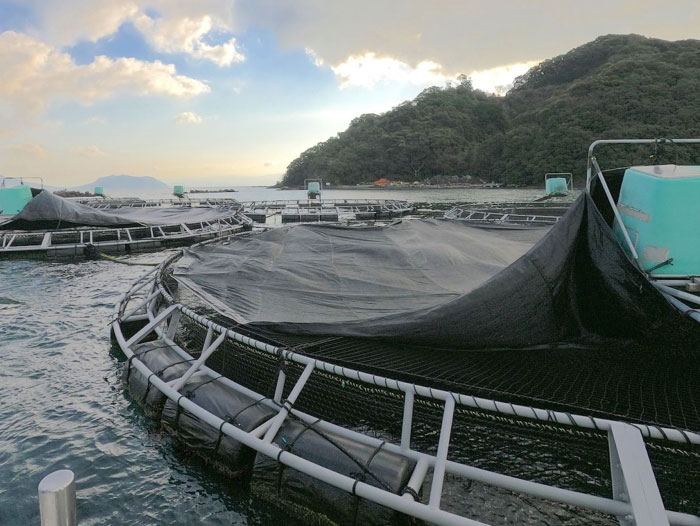First Red Sea Bream Aquaculture Improvement Project (AIP) in Japan Launched Aiming for ASC Certification in 2021
June 30, 2020 | 4 min to read

Tokyo, Japan – Seafood Legacy Co., Ltd., Kumamoto Seawater Culture Fisheries Cooperative and Urata Suisan Co., Ltd. have launched Japan’s first red sea bream (madai) Aquaculture Improvement Project (AIP) on June 30, 2020. The AIP will encompass two red sea breamfarms owned and operated by Urata Suisan in Amakusa area of Kumamoto Prefecture.
With favorable coastal geography and oceanic conditions, Kumamoto prefecture has developed a robust aquaculture industry centered around Amakusa Ueshima, Shimoshima and Ashikita regions from 1965. Red sea bream aquaculture is one of its most important aquaculture industries — Kumamoto boasts the second highest production volume of farmed red sea bream in Japan — with roughly 10,000 tons produced annually which accounts for more than half of the prefecture’s farmed fish production volume. Madai has traditionally been considered a symbolic food item in Japan to mark celebrations for
many centuries.
Furthermore, the prefectural government promotes an aquaculture best practices certification process for its aquaculture producers to ensure locally produced farmed fish meet high quality and safety standards. This certification includes practices such as: use of domestically sourced smolt, record keeping of farm operations, and setting strict guidelines for periodic inspections of chemical products used by farms.
In addition to implementing these practices, Kumamoto Seawater Culture Fisheries Cooperative Association and Urata Suisan have decided to take steps to turn to a more sustainable and responsible production of their farmed red sea bream. By launching AIP, they set their sights on obtaining ASC certification next year in order to further differentiate their products in the domestic and international markets.
Kumamoto Seawater Culture Fisheries Cooperative Association conducted an ASC pre-assessment with Urata Suisan’s red sea bream farms in 2019 and Seafood Legacy developed an AIP workplan based on the pre-assessment results, leading to the launch of this collaborative effort to improve Urata Suisan’s red sea bream aquaculture to reach ASC certification by 2021. Improvements to be implemented through the AIP include monitoring of environmental impacts of net cages to the surrounding ecosystem and habitats, ensuring sustainability of fish feed and smolt, management of diseases and parasites, and development of social responsibility policies and guidelines.
Comments from Participants:
Masaki Urata, CEO of Urata Suisan Co., Ltd.:
“We operate our farms in the warm waters of the Yatsushiro inland sea off the coast of Goshoura Island in Amakusa, Kumamoto prefecture. By raising our fish from smolt using complete pelleted feed we provide farmed fish with stable quality and management year-round. By improving on environmental sustainability, social responsibility and traceability through this project, our goal is to raise the possibility of aquacultures and help further develop the industry for the future.”
Akiyuki Kanabo, Processing Division Sales Manager of Kumamoto Seawater Culture Fisheries Cooperative “Kumamoto Seawater Culture Fisheries Cooperative is a cooperative association of mariculture fisheries, with our members mainly operating in the Amakusa Ueshima and Shimoshima areas of Kumamoto prefecture. We are comprehensively engaged in developing the aquaculture business of our cooperative members and local community in order to promote the development of the region’s aquaculture community. By working toward acquiring ASC certification, we are committed to minimize the environmental impacts of aquacultures in a socially responsible way and supporting our local community.”
Shunji Murakami, Vice President and COO of Seafood Legacy, Co., Ltd.:
“We believe that the establishment of Japan’s first red sea bream AIP with the goal of acquiring ASC certification — its standards internationally recognized as a rigorous guideline for responsible aquacultures — will not only heighten the domestic and international market competitiveness for the project’s participants, but will also contribute to the local economy as well as add to the growing efforts being implemented to meet the UN Sustainable Development Goals. We strive for this project to be a positive model that will lead to prosperity for the participants and its region, and contribute to the growth strategy for the domestic aquaculture industry in Japan.”
About Kumamoto Seawater Culture Fisheries Cooperative
Kumamoto Seawater Culture Fisheries Cooperative is a cooperative association that conducts sales, processing, purchasing and guidance related businesses for its member mariculture fisheries. The cooperative implements stringent quality and hygienic management from the feed that farmers utilize to the management of fish in pens, processing and distribution operations. It also takes part in environmental conservation efforts, such as water quality and benthic monitoring of fishing grounds and cleaning the sea.
About Urata Suisan Co., Ltd.
Urata Suisan is a mariculture farmer that operate red sea bream and striped jack mackerel farms in Goshoura Town of Amakusa, Kumamoto prefecture. For its red sea bream farms, Urata Suisan raise their smolt for one and a half years at their Hinoshima fishing ground, which then are transported and raised in their Maejima fishing ground for another year until the fish reach shipment size of 2kg.
About Seafood Legacy Co., Ltd.
Seafood Legacy Co., Ltd. is a social venture based in Tokyo which provides sustainable seafood consulting and platforming services to Japanese fishery, seafood businesses and government. Seafood is a symbol of the connections between marine ecosystems, marine economics, and regional communities, and our purpose is to ensure that it remains abundant for future generations. Seafood Legacy also strategically networks seafood businesses and NGOs to foster a pre-competitive platform to solve mutual issues that various stakeholders face in Japan and the world.
See more about details regarding Kumamoto Red Sea Bream AIP here: https://seafoodlegacy.com/english/cases/kumamoto-red-sea-bream-aip/
